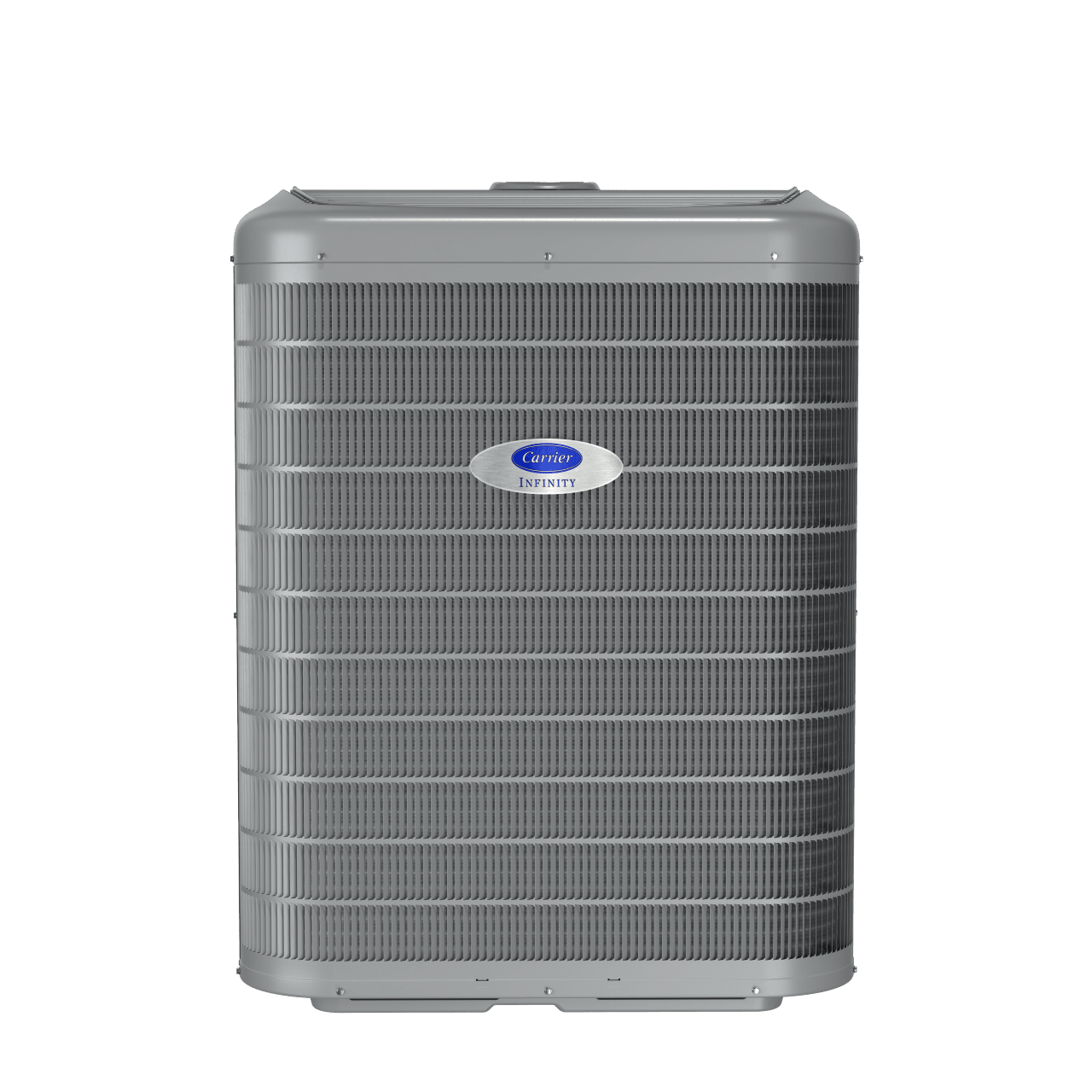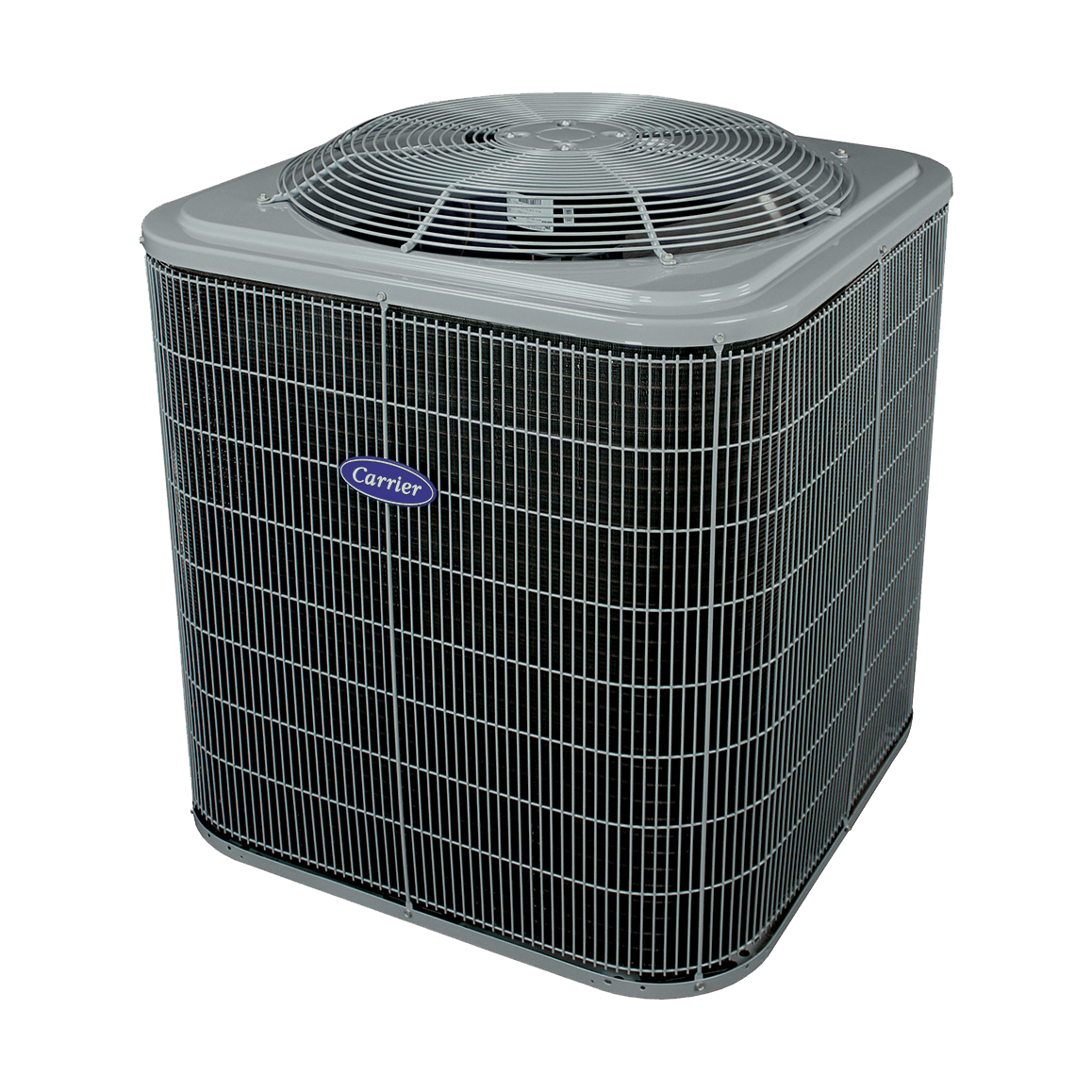Guide to Air Conditioning (AC) Installations
By Travis Baugh
If you're considering AC installation for your home, this guide will help you understand what to expect when installing a new air conditioning system. Discover what is involved, what homeowners should consider when selecting both a unit and a professional installer, and common questions related to installing a new AC.
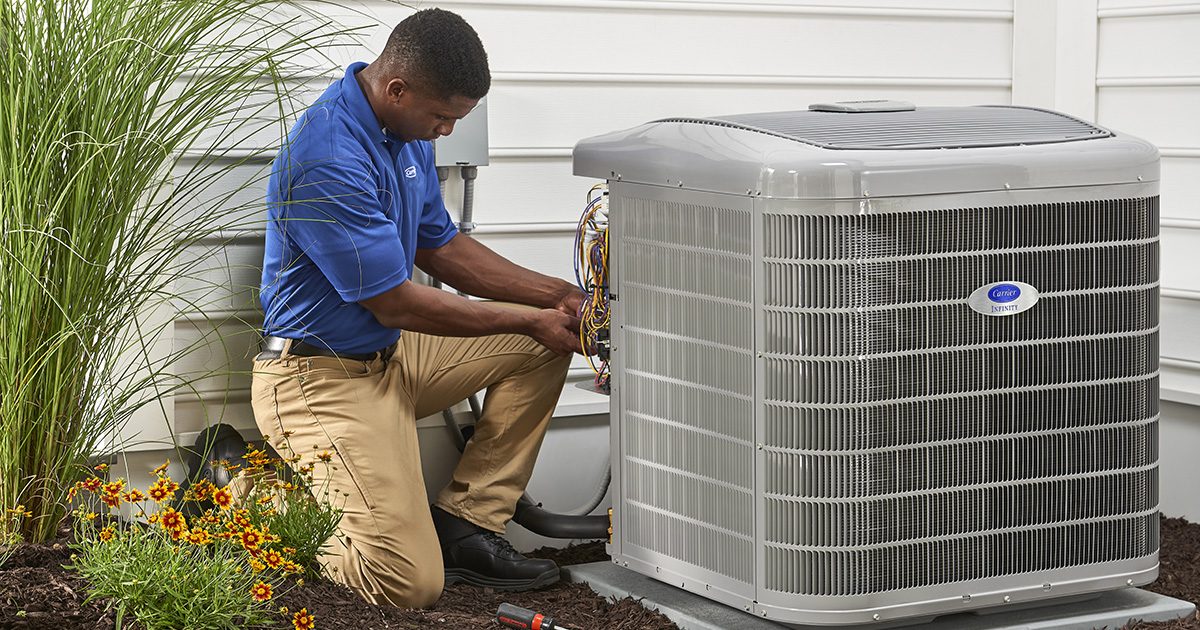
Four Factors to Consider Before Installing an AC Unit
Installing an air conditioning system is a significant investment, and several factors should be considered to ensure optimal performance and efficiency.
1. Type of System
Decide what type of system is best for your needs. Consider factors like what size air conditioner you need, size, budget, climate, and air conditioner price. Types of AC systems include air conditioning, ductless mini splits, and heat pumps.
2. Energy Efficiency and Home Comfort
Look for a unit with a high SEER2 (Seasonal Energy Efficiency Ratio) rating to help reduce your home comfort costs.
3. Installation Costs and Tax Rebates
Factor in not just the cost of the AC unit but also installation expenses, ductwork modifications (if needed), and additional features like smart thermostats. Then, factor in savings from local utility rebates your new air conditioner may qualify for.
4. Indoor Air Quality
Modern split air conditioning systems often include air filtration and humidity control features, improving indoor air quality and comfort.
Careful planning helps ensure a cost-effective and efficient AC system tailored to your needs.
The AC Installation Process, Step-by-Step
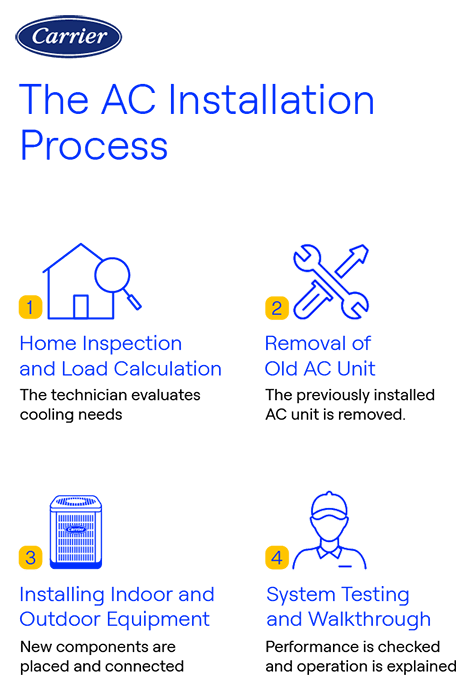
Carrier dealers are committed to providing a seamless and efficient process for air conditioning installation, ensuring that your new air conditioner is installed with utmost precision and care. Here’s a closer look at the typical AC installation process:
1. Home Inspection and Load Calculation
Before new AC installation begins, your Carrier dealer will visit your home to assess the site and determine the best air conditioner for your home and the location for your new air conditioner . They consider factors such as proper airflow, accessibility, and safety. Additionally, they prepare the site by ensuring it is clean and free from obstacles that may hinder the installation process.
2. Removal of Old AC Unit (if needed)
If you are replacing an old air conditioner, our team will carefully remove the existing AC unit , ensuring it is disconnected safely and all components are properly disposed of. This step is crucial to make way for the new air conditioner and to ensure a smooth transition.
3. Installing Indoor and Outdoor Equipment
Once the site is prepared and the existing unit is removed, the technician will install the outdoor and indoor components of your new air conditioner. They connect the necessary electrical wiring, refrigerant lines, and drainage systems to ensure proper functioning, and also conduct safety checks.
4. System Testing and Walkthrough
After installation, the technician will turn on the AC unit and test its operation, checking for proper airflow, cooling efficiency, and any unusual noises or leaks. A final inspection will be performed on all connections and components to ensure they are secure, fine-tuned, and functioning correctly. Finally, the technician will explain the system operation and AC maintenance best practices to educate the homeowner.
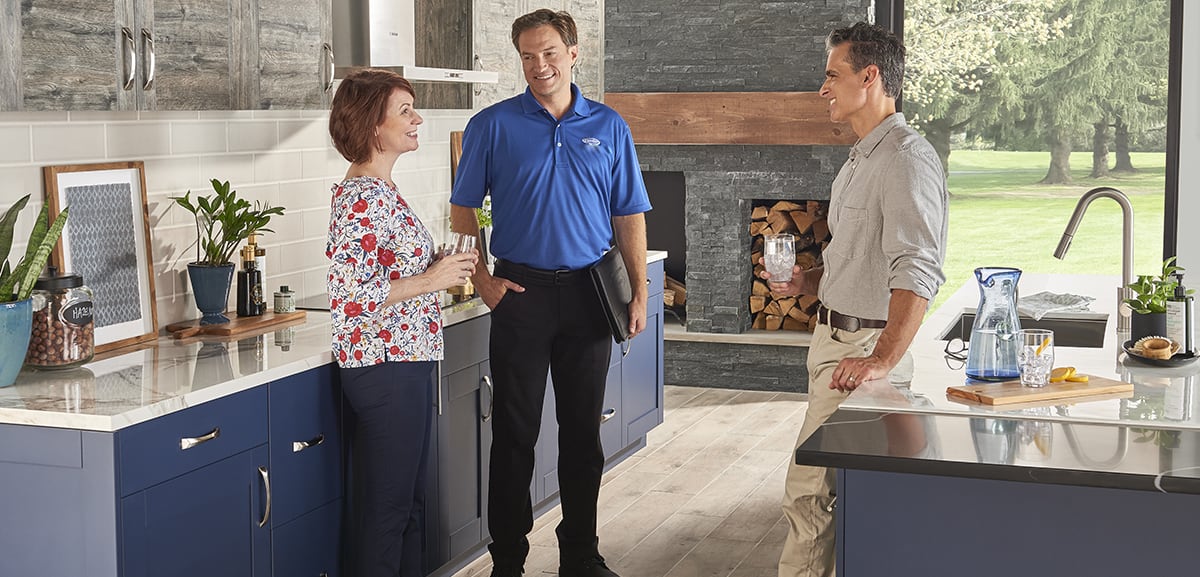
Benefits of Professional Air Conditioning Installation
Trusting professionals for air conditioning installation is vital for optimal performance and longevity. Here are some of the key benefits:
Proper Sizing and Placement
Professional AC installers have the expertise to determine the appropriate size of the air conditioner for your space. They consider factors such as home size, insulation, and heat load to ensure your unit is neither too small nor too large, resulting in efficient cooling and energy savings. They also identify the ideal location for installation, avoiding obstructions and ensuring proper airflow for maximum efficiency.
Optimal Airflow and Temperature Control
A properly installed air conditioner ensures optimal airflow throughout your home. Professional air conditioning installers position vents and ducts carefully to ensure even distribution of cool air. They also calibrate the system for precise temperature control, providing you with maximum comfort.
Extended Lifespan of the Unit
Correct installation of air conditioners can significantly extend the lifespan of your AC. Professional air conditioner installers follow manufacturer guidelines and best practices, reducing the risk of premature wear and tear. This means fewer repairs and AC replacements, ultimately saving you money in the long run.
Jennifer Fletcher, owner of Modern Air Solutions in Gurnee, IL said having a professional handle AC installation offers significant benefits for homeowners.
“Most people don’t have the specialized tools or expertise to properly measure static pressure or refrigerant levels, which are critical for system performance and longevity,” Fletcher said. “A professional installation ensures the system operates safely, efficiently, and reliably from day one, protecting both comfort and your investment.”

Why Choose Carrier to Install Your AC?
Once you're ready to move forward with installation, Carrier's trusted dealer network can help you select the right system and handle the job professionally.
Carrier is a trusted industry leader known for its high-quality and reliable air conditioning units that deliver superior comfort and energy efficiency. Their advanced technology ensures optimal cooling performance while reducing cooling costs.
One of Carrier’s key advantages is its network of expert Factory Authorized Dealers. These professionals undergo rigorous training and certification, ensuring they have the knowledge and expertise to install your system correctly. Carrier installation technicians follow strict guidelines to ensure proper sizing, placement, and calibration of your AC unit. This meticulous approach enhances system longevity, prevents future issues, and optimizes cooling performance.
By choosing Carrier, you get a seamless installation experience, energy-efficient solutions, and long-term reliability for your home comfort.
Find a Carrier AC Installer Near You
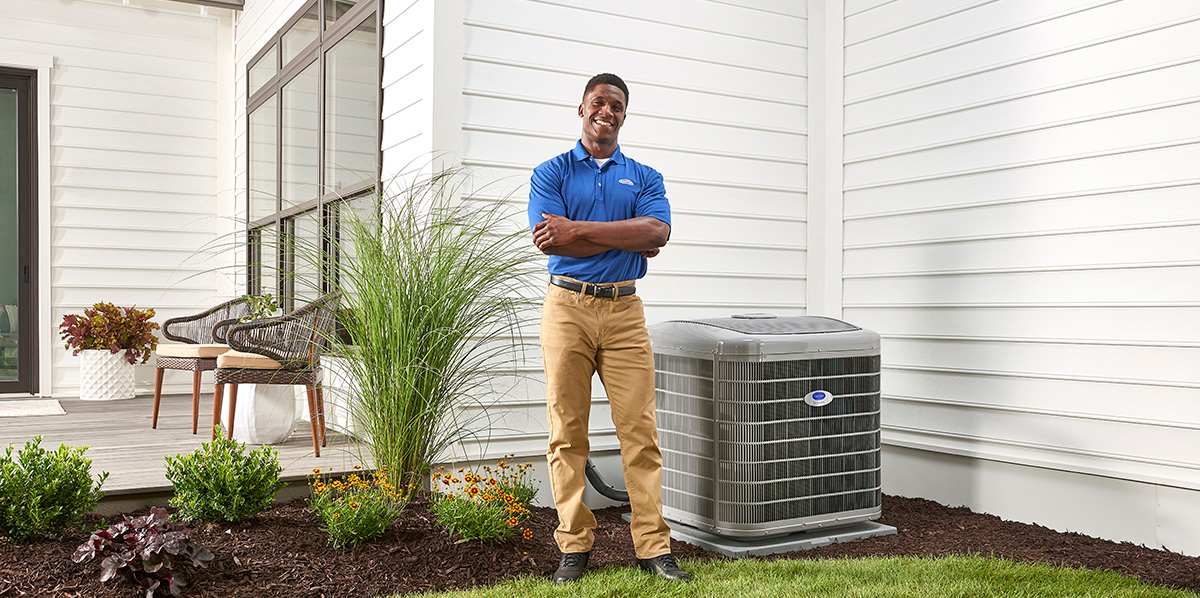
Explore Carrier Air Conditioners
Up to 21 SEER2 for premium energy savings with premium comfort features
Up to 16.5 SEER2 for enhanced energy savings with standard comfort features.
Up to 16.5 SEER2 for enhanced energy savings with standard comfort features.
AC Installation FAQs for Homeowners
Learn More About Air Conditioning
- Learn the ins and outs of HVAC installation
- Find Out How Do Air Conditioners Work
- Factors and variables - "How Long Do Air Conditioners Last?"
- Learn about wall mounted air conditioners, also known as ductless mini splits
- Explore the value of inverter air conditioners
- Learn about AC sizes: 2 ton AC unit, 2.5 ton AC unit, 3 ton AC unit, 4 ton AC unit, 5 ton AC unit
